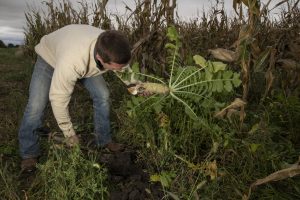Stop factory farming
November 7, 2019
I think that everyone should hear the truth about factory farming. Most people go to the store not thinking about how some food can be so cheap and where it’s made. The answer is factory farming.
You may ask, why is factory farming so bad? It does have advantages, such as high efficiency and cheap animal products, but it also has disadvantages. Factory farms can create health hazards because animals are over-crowded and require a lot of antibiotics. This makes it easier for disease to spread.
Also, when thousands of beef cattle are packed into feedlots full of manure, bacteria can get on their hides and then into the slaughterhouses. The faster an animal is processed or the more milk an animal produces, the more profitable the operation. Approximately two-thirds of all beef cattle in the U.S. are given growth hormones, and approximately 22 percent of dairy cows are given hormones to increase milk production.
Animals suffer under these conditions, and I don’t think it’s alright for the animals to be treated this way.
Also, climate stability is greatly affected by factory farms, with 37 percent of methane emissions coming from factory farming.
We don’t have to be eating in a way that does harm to animals and the environment. We do have alternatives to factory farming: We can buy local food, support local farmers, buy fair trade products, raise awareness about hunger and farming systems, and talk to stores and restaurants about offering local foods.
We still have hope; we just need more people to support sustainable farming. I hope you start thinking more about the impact of the food you eat.
— Kamila Swanson, North Central Junior High School seventh-grader



